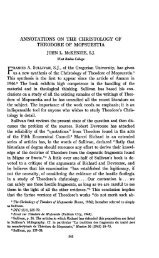Theology for Artisans of a New Humanity - Theological Studies
Theology for Artisans of a New Humanity - Theological Studies
Theology for Artisans of a New Humanity - Theological Studies
Create successful ePaper yourself
Turn your PDF publications into a flip-book with our unique Google optimized e-Paper software.
CHALLENGE OF SEGUNDO 133<br />
enee to the Church. If one considers also the huge commercial propaganda<br />
machine that today molds all human consciousness in what has<br />
been called the "global shopping center," it is difficult to perceive any<br />
other ecclesial possibility but that <strong>of</strong> a creative minority as proposed by<br />
Segundo. 20 It is also plausible that a clearer picture <strong>of</strong> the lineaments <strong>of</strong><br />
this future Church must await the deliberations <strong>of</strong> the next ecumenical<br />
council; in that case, a deepening <strong>of</strong> the preparatory theological dialogue<br />
on the issue raised by Segundo assumes even greater importance at the<br />
present time.<br />
The principal objection to Segundo's ecclesiology is clearly that <strong>of</strong><br />
"elitism," a charge which he vigorously rejects. 21 Perhaps this objection<br />
would be mitigated somewhat if Segundo devoted greater emphasis to<br />
the stages <strong>of</strong> personal growth involved in the understanding and practice<br />
<strong>of</strong> the Christian ideal, as well as to the reality <strong>of</strong> human sinfulness.<br />
But that does not imply that the ideal itself should be reduced to a<br />
minimum <strong>for</strong> mass acceptance; discipleship still involves the following<br />
<strong>of</strong> Christ in a life <strong>of</strong> self-sacrificing love, even unto death. If the Church<br />
did not strive to embody this in its teaching and practice, it would lose<br />
its credibility as a sign <strong>of</strong> God's plan <strong>for</strong> humanity, substituting the<br />
quest <strong>for</strong> individual security in place <strong>of</strong> a summons to creative responsibility.<br />
Furthermore, this position is not peculiar to Latin America. The<br />
North American ecclesiologist Richard P. McBrien has noted that the<br />
Church makes no sense apart from the kingdom, and that today most<br />
theologians hold this position in one <strong>for</strong>m or other. Basically, this view<br />
"regards history as in process <strong>of</strong> becoming the kingdom <strong>of</strong> God, and the<br />
Church as sign, instrument, and herald <strong>of</strong> this ongoing reality." 22 I<br />
would suggest that the merit <strong>of</strong> Segundo's contribution lies in moving<br />
20 Robert Bellah has presented some sombre reflections in this area throughout his<br />
recent The Broken Covenant. For example, referring to the institution <strong>of</strong> advertising, he<br />
observes: "That happiness is to be attained through limitless material acquisition is<br />
denied by every religion and philosophy known to man but is preached incessantly by<br />
every American television set. . . . Few societies could imagine themselves surviving<br />
very long when one <strong>of</strong> their central institutions was advocating unrestrained greed. Are<br />
we so different from all other societies?" (The Broken Covenant: American Civil Religion<br />
in Time <strong>of</strong> Trial [<strong>New</strong> York: Seabury, 1975] p. 134).<br />
21 Patrick J. Burns touches on this point in "Elitist Tendencies and Consumer Pressures<br />
in American Society," Catholic <strong>Theological</strong> Society <strong>of</strong> America: Proceedings <strong>of</strong> the<br />
Twenty-Eighth Annual Convention (<strong>New</strong> York: Manhattan College, 1973) pp. 47-69, and<br />
esp. p. 65, n. 25.<br />
22 Richard P. McBrien, Church: The Continuing Quest (<strong>New</strong> York: <strong>New</strong>man, 1970) p.<br />
68. Besides its exposition <strong>of</strong> McBrien's own position, this brief but important work<br />
contains an excellent survey <strong>of</strong> the competing ecclesiologies <strong>of</strong> Vatican II (pp. 23-41) and<br />
<strong>of</strong> key developments since then (pp. 43-65).
















